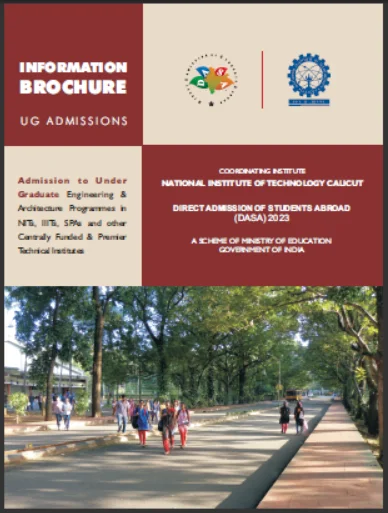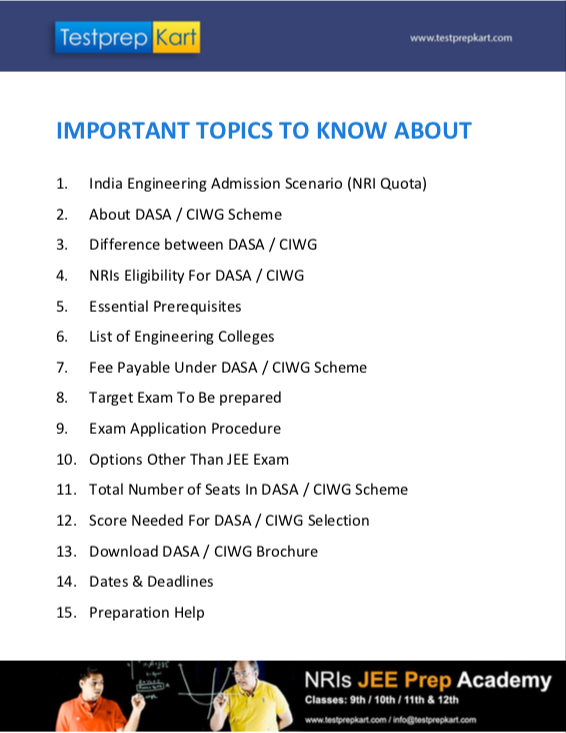NRIs Guide to JEE Main & JEE Advanced
NRI e-Book guide is one of the best books to understand all about DASA and CIWG Scheme to NRI, OCI, PIO & FN students. This book is specially designed in such a manner that every NRI Candidate finds it very helpful. JEE Main examination is one of the prerequisites to writing the JEE Advanced examination which facilitates admission into all the IITs.
For DASA and CIWG Candidates here is the Ebook for all the students. Download the Ebook in pdf format through the given link.
Get JEE Prep Help Download NRI JEE E-BOOK
Eligibility for DASA/CIWG Scheme
Direct Admission to Student Abroad program ("DASA") Information Brochure mandating Indian Nationals to complete at least two years of education, including their 11th and 12th grade of education in a Foreign Country during the last eight years, and further mandatory.
DASA Brochure
DASA will be conducted by NIT Warangal. This is officially announced on the DASA Website. So, the host NIT Warangal will soon release the DASA Brochure as well.
The admissions to various undergraduate and post-graduate programs of premier institutes in India under the DASA Scheme would be made by the JEE Main Score.

Academic Eligibility Criteria for NRI Students as per DASA
1. Students must clear class 11th & 12th from any recognized board outside India.
2. Students must have Physics and Mathematics main subjects in class 11th & 12th.
3. Candidates should score a minimum of 60% in 12th grade.
4. Students must qualify JEE mains exam as per the cut-off.
5. NRIs, PIOs, OCIs, and FNs who are residing and studying abroad for the last 2 years can apply.
6. There is no age limit for attempting JEE Main.
7. Students who appeared for the class 12th exam but the result is awaited and are likely to get the result this year, can also apply.
Documents Required For Admission in the DASA Scheme
The following documents (Originals and two sets of photocopies) are to be produced at the time of Admission.
(1) Allotment letter for admission
(2) X Class Pass Certificate / X Marks Sheet
(3) X+2 Pass Certificate / X+2 Marks Sheet
(4) Study and Conduct Certificate
(5) JEE Score Card / JEE Score Report
(6) Transfer Certificate
(7) Migration Certificate
(8) Passport
(9) For CIWG candidates# a. Passport of a parent working in gulf b. Visa of a parent working in gulf c. Letter from the company of parent working in gulf
(10) Four recent color passport size photographs
Total Number Of Seats Under DASA/CIWG Scheme
The total number of seats under the DASA Scheme in the year 2023 was 3211 after the special round. Out of 2141 reserved for DASA candidates, 1071 were reserved for CIWG candidates.
Total Seat Reserved For CIWG Candidates for NITs
There is a total of 15% of average seats reserved for DASA Candidates Out of which ⅓ are reserved for CIWG Candidates.
DASA Fees Structure For NITs and Other Institutes
|
Admission Stream |
Registration Fee (Non-Refundable) |
Tuition Fee (for 1st semester only) |
|
DASA (Non-SAARC) |
300 USD |
4000 USD |
|
DASA (SAARC) |
300 USD |
2000 USD |
CIWG Fees Structure For NITs and Other Institutes
|
Admission Stream |
Registration Fee (Non-Refundable) |
Tuition Fee (for 1st semester only) |
|
CIWG |
300 USD |
62,500 INR |
DASA Opening and Closing Cut-Off Score For Admission Under Indian Institutes
Below mentioned are the Cut-Offs of DASA/CIWG opening and closing ranks.
|
DASA/CIWG Cut-Off |
Download Cut-Off Score |
|
Round 1 CIWG Cut-Off 2021 |
|
|
Round 1 Non-CIWG Cut-Off 2021 |
|
|
Round 2 CIWG Cut-Off 2021 |
|
|
Round 2 Non-CIWG Cut-Off 2021 |
|
|
Round 3 CIWG Cut-Off 2021 |
|
|
Round 3 Non-CIWG Cut-Off 2021 |
JEE Main Exam Centre Outside India For DASA Candidates
| S.No. | Exam City | Country | City Code |
| 1 | Manama | Bahrain | ZZ01 |
| 2 | Colombo | Sri Lanka | ZZ02 |
| 3 | Doha | Qatar | ZZ03 |
| 4 | Dubai | UAE | ZZ04 |
| 5 | Kathmandu | Nepal | ZZ05 |
| 6 | Muscat | Oman | ZZ06 |
| 7 | Riyadh | Saudi Arabia | ZZ07 |
| 8 | Sharjah | UAE | ZZ08 |
| 9 | Singapore | Singapore | ZZ09 |
| 10 | Kuwait City | Kuwait | ZZ10 |
| 11 | Kuala Lumpur | Malaysia | ZZ11 |
| 12 | Lagos/Abuja | Nigeria | ZZ12 |
| 13 | Jakarta | Indonesia | ZZ13 |
| 14 | Canberra | Australia | ZZ14 |
| 15 | Vienna | Austria | ZZ15 |
| 16 | Brasilia | Brazil | ZZ16 |
| 17 | Ottawa | Canada | ZZ17 |
| 18 | Hong Kong | Hong Kong | ZZ19 |
| 19 | Port Luis | Mauritius | ZZ20 |
| 20 | Moscow | Russia | ZZ21 |
| 21 | Cape Town | South Africa | ZZ22 |
| 22 | Bangkok | Thailand | ZZ23 |
| 23 | Washington D.C. | USA | ZZ24 |
| 24 | Hanoi | Vietnam | ZZ25 |
| 25 | Abu Dhabi | UAE | — |
JEE Main for OCI Candidates
OCI stands for Overseas Citizen of India and is a lifetime status. It is quite close to dual citizenship offered by other countries
We can see that they are not considered the equivalent of Indian citizens like NRI candidates. There have been issues in the past where these candidates were not allowed to write these entrance examinations.
But recently the government of India has stated that the OCI students can also appear for JEE examinations and seek admissions into Indian Institutes of Technology (IITs), National Institutes of Technology (NITs), Centrally Funded Technical Institutes (CFTIs), and Indian Institutes of Information Technologies (IIITs).
These admissions will be treated as “foreign nationals” and they will be given admission in the supernumerary category. They will not be able to avail of admission in the general quota and also cannot avail of reservation if their parents belong to the OBC/SC/ST categories in India.
Also, they will be levied non-subsidized academic fees during their period of study.
JEE for Foreign Nationals
Students who are citizens of other countries, not citizens of India, do not belong to the OCI/PIO category, and whose parents are not citizens of India are considered foreign nationals. Such candidates may also get admission into IITs and other Indian universities.
For IIT admissions, only candidates in the 'foreign nationals' category do not need to appear for JEE Main. They can directly register & appear for JEE Advanced.
Foreign Nationals from any country can choose to study in Indian universities. For admission into National Institutes of Technology (NITs), Centrally Funded Technical Institutes (CFTIs), and Indian Institutes of Information Technologies (IIITs), they can appear for the JEE Main examination.
Foreign Nationals can also choose Exam Center within India if they are appearing/passed class 12 from an institute in India.
How To Apply for JEE Exam – for NRI, PIO, OCI & Foreign Nationals
Having understood the differences among these categories now let us look at how candidates belonging to these categories can apply for JEE examinations and gain admission into the most prestigious institutions in India.
Registration Fee for JEE Examination Centres in India:
-
Candidates from SAARC countries USD 75
-
Candidates from Non-SAARC countries USD 150
Also refer to DASA / CIWG Schemes for Foreign Nationals, NRI, OCI & PIO candidates. 10% of the total seats are allocated to foreign nationals in every course.
These numbers are supernumerary, i.e. additional seats are made available to the external to the total number of seats available in the colleges.
Hence it does not reduce the number of seats available to Indian nationals. The foreign national applicants should possess identity proof of both, the parents and candidates in the form of a citizenship certificate/ passport.
JEE Advanced for NRI, PIO, OCI, FN Students
NRI Candidates
NRI candidates who wish to gain admission into IITs need to appear for JEE Advanced after qualifying for JEE Main. They have no quota of reservations at IITs. Their eligibility criteria are as follows:
-
Candidates must have scored positive marks and cleared JEE Main examination.
-
They must have been born on or before October 1, 1996, as of the 2022 JEE Advanced examination. Five years of relaxation is given to SC/ST/PWD candidates.
-
They can attempt the JEE Advanced examination a maximum of two times and only in two consecutive years.
-
Candidate must be appearing for the 12th standard or equivalent examination in 2022 or must have completed it in 2022.
-
The candidate should not have been admitted into any IIT earlier or found not eligible in the previous JEE Advanced examination.
The application fee for the exam center outside India will be different from the exam center in India. The application for the last academic year for writing the exam in a center outside India was as follows:
Registration Fee for Examination Centres in Foreign countries
-
Candidates from SAARC countries USD 75
-
Candidates from Non-SAARC countries USD 150
Apart from this, all the other procedure is the same for NRI candidates.
JEE Advanced For OCI Candidates
For PIO and OCI holders to apply for JEE Advanced, they can also go through the same procedure as Indian citizens. The only drawback will be the Reservation that is available to Indian and NRI students.
The quota system available for OBC/SC/ST candidates is not available for PIO and OCI card holders even though Parents (if Indian Citizens) qualify. They will fall within the general category and will have the same procedure for qualifying for the examination to gain admission.
JEE Advanced For Foreign Nationals
Foreign national candidates do not require to write the JEE Main to get into the IITs. They can directly register for JEE Advanced exam. For this they have a separate set of eligibility criteria:
-
Candidates must not be a citizen of India or belong to the category of NRI/OCI/PIO.
-
Candidates must have scored at least 75% aggregate in their 12th standard or equivalent exam. If a Board awards non-numerical grades (that are not in the range of 0 to 100) without providing an equivalent percentage of marks on the grade sheet, the candidate should obtain a certificate from the Board specifying the equivalent marks and submit it. As an alternative, they may also produce evidence that they fall within the top 20 percentile of successful candidates in their respective Grade 12th (or equivalent).
-
They must have been born on or after October 1, 1996, for JEE 2022.
-
The candidate should not have been admitted to any IITs or whose admission was canceled in the past for being not eligible to appear in JEE.
-
Documents required by foreign nationals include a Visa, Passport, and Residential Permit at the time of admission.
JEE Application Process
The application process for NRI /PIO /OCI /foreign nationals is similar to that of Indian Nationals except for certain features. Refer to JEE Main Application / Registration Process
-
In the field where you are asked to select the State where you are completing your 12th standard or equivalent examination, NRI/OCI/foreign nationals need not fill it.
-
The field “Select State mentioned on your passport” is to be filled only if the candidate has passed class 12th from outside India and falls under the category of Foreign national.
-
If you fall under the NRI category, you must produce an Aadhar number. If you have not yet received an aadhar you must enter an enrolment ID of an Aadhar application.
-
For the field requesting your “Board Name”, select “Other” from the drop-down list if you belong to Nepal /Bhutan /PIO /OCI /Foreign Nationals.
JEE Admit cards
The admit cards for both JEE Main and JEE Advanced will be made available online for all candidates who have successfully completed the registration process. No hard copy of admit card will be mailed via post to you.
This must be downloaded & then printed by the candidate by logging in to the registered accounts on the official NTA portal (for JEE Main) & on the official jee advanced website (for JEE Advanced. It must be carried by the candidate at the time of examination.
The examination date for all Indian candidates, as well as candidates belonging to the NRI/OCI/Foreign national categories, will be held on the same day.
The details of the examination time and date, as well as the center allotted, will be mentioned on the admit card. Speaking of time, applicants with exam centers outside India must report according to Indian Standard Time.
Download NRI JEE Prep eBook

Free JEE Preparation Resources Download







Leave a Reply